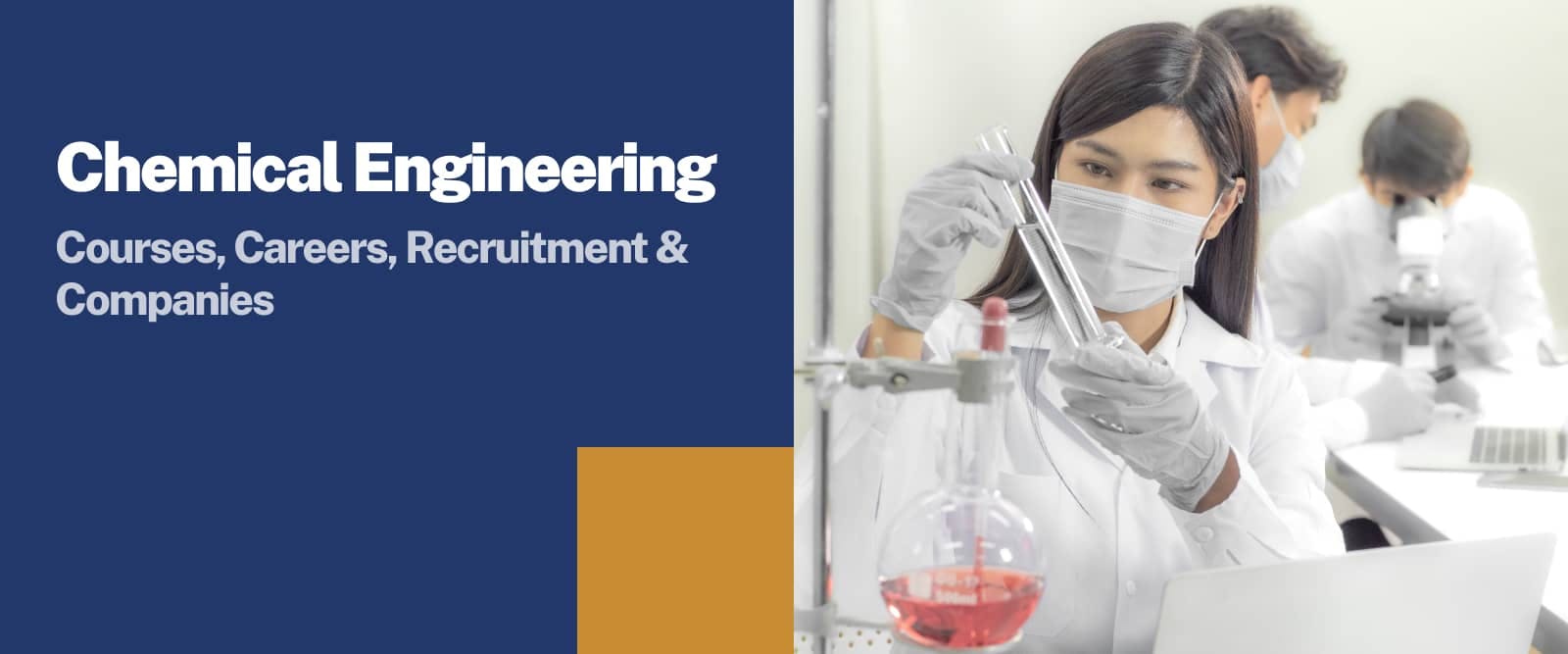5800 students unlocked their dream jobs with UG/PG programs in top colleges. Apply Now!
Chemical Engineering is a branch of engineering that deals with the design, development, and maintenance of processes for the production and use of chemicals, fuels, and other products. Chemical engineers apply their chemistry, physics, and mathematics knowledge to develop new products, optimise existing processes, and solve technical problems. They work in various industries, including the chemical, petrochemical, energy, pharmaceutical, and food industries.
A B.Tech course is a great way to learn chemical engineering and start your career in this field. You may also decide to pursue a master's in chemical engineering after your undergraduate, but the B.Tech subjects will give you enough depth of knowledge to prepare you for the industry.
Read this blog to learn more about Chemical engineering. It will help you make better decisions if you are choosing this engineering stream.
Scope for Chemical Engineering
The scope of chemical engineering is constantly evolving. There is a growing demand for chemical engineers across the globe due to the increasing need for efficient, safe, and sustainable production processes and products. The following industries recruit chemical engineers.
- Manufacturing and production: Chemical engineers are involved in the production of a wide range of products, including petrochemicals, pharmaceuticals, cosmetics, fertilisers, and more.
- Energy and environment: Chemical engineers play a critical role in the development of cleaner, more efficient energy sources and technologies, as well as in the management of environmental challenges, such as air and water pollution and waste management.
- Food and agriculture: Chemical engineers contribute to the design and optimization of processes for the production of food and agricultural products, such as processing and packaging, preservation, and quality control.
- Biotechnology and pharmaceuticals: Chemical engineers work in the development and production of drugs, vaccines, and other biopharmaceutical products, as well as in the design of bioreactors and bioprocesses.
- Research and development: Chemical engineers are involved in research and development across many industries, conducting experiments and developing new products, technologies, and processes.
- Sales and marketing: Chemical engineers work in sales and marketing, promoting and selling chemical products and technologies to clients and customers.
- Consulting: Chemical engineers provide technical and business advice to clients in various industries, including manufacturing, energy, and the environment.
[Also read: internships for engineering students]
Eligibility for B.Tech in Chemical Engineering
To be eligible for a B.Tech course in chemical engineering, you typically need to meet the following requirements:
- Completed 10+2 years of education with science subjects: You will need to have completed 10+2 years of education with science subjects, such as physics, chemistry, and mathematics.
- Achieved a minimum required percentage of marks: The minimum required percentage of marks in 10+2 or equivalent examination may vary from institution to institution.
- Meeting additional requirements: Some institutions may have additional requirements, such as a minimum score on a standardised entrance examination like
- Joint Entrance Examination (JEE) in India: JEE is one of the most widely recognized engineering entrance exams in India and is used to gain admission to top engineering colleges in the country.
- Graduate Aptitude Test in Engineering (GATE) in India: GATE is a national-level examination for admission to postgraduate programs in engineering and technology, including chemical engineering.
- Graduate Record Examination (GRE) in the USA: The GRE is a standardised test that measures verbal reasoning, quantitative reasoning, and analytical writing skills, and is required for admission to many graduate programs in the USA, including chemical engineering.
Admission Process for B.Tech Chemical Engineering
If you have chosen a B.Tech program in Chemical Engineering, here is the process to get admission to the course.
- Meet the eligibility criteria: To be eligible to apply for a chemical engineering program, you will typically need to have completed 10+2 years of education with science subjects, such as physics, chemistry, and mathematics, and achieved a minimum required percentage of marks.
- Clear the entrance examination: Many institutions require applicants to take a standardised entrance examination, such as the Joint Entrance Examination (JEE) in India or the Graduate Record Examination (GRE) in some countries.
- Submit your application materials: You will typically need to submit your academic transcripts, test scores, a personal statement, and letters of recommendation as part of your application.
- Clear the interview round: Some institutions may require you to participate in an interview or assessment centre to demonstrate your knowledge and skills.
- Wait for a decision: After submitting your application, you will need to wait for a decision from the institution. If you are offered a place, you will need to confirm your acceptance and complete any additional enrollment requirements.
B.Tech Chemical Engineering Syllabus
B.Tech subjects entail various important aspects that are needed to understand the in and out of Chemical Engineering.
|
Semester 1 |
Technical English |
|
Engineering Mathematics– I |
|
|
Engineering Physics |
|
|
Engineering Chemistry |
|
|
Semester-II |
Engineering Materials |
|
Chemical Process Calculations |
|
|
Introduction to Chemical Engineering |
|
|
Engineering Physics-2 |
|
|
Semester-III |
Energy Balance and Thermodynamics |
|
Fluid Mechanics |
|
|
Mechanical Operations |
|
|
Instrumental Methods of Analysis |
|
|
Mathematics-3 |
|
|
Semester-IV |
Chemical Engineering Thermodynamics |
|
Mathematics-4 |
|
|
Heat Transfer |
|
|
Chemical Technology |
|
|
Membrane Separation Technology |
|
|
Semester-V |
Chemical Reaction Engineering I |
|
Optimization Techniques |
|
|
Diffusional Mass Transfer Operations |
|
|
Statics and Strength of Materials |
|
|
Semester-VI |
Chemical Reaction Engineering II |
|
Process Dynamics and Control |
|
|
Materials Technology |
|
|
Equilibrium Staged Operations |
|
|
Semester-VII |
Process Equipment Design and Drawing |
|
Elective |
|
|
Modelling, Computer simulation & Optimization |
|
|
Polymer Technology |
|
|
Semester-VIII |
Elective |
|
Elective |
|
|
Final Project |
|
|
Comprehensive Viva Voce |
Best Colleges for B.Tech Chemical Engineering
IIT, Pan India
As a premier institute in India, IIT offers B.Tech in Chemical Engineering courses across its top campuses in India. The highly skilled faculty, polished curriculum, industry-oriented training, and stellar placement opportunities make IIT a go-to to pursue a B.Tech program in Chemical Engineering.
Entrance Exams: JEE, GATE
Fees: Upto ₹10 Lakhs
VIT, Vellore
VIT is a renowned technical university in India, offering a Bachelor of Technology B.Tech program in Chemical Engineering. The program is designed to provide students with a strong foundation in the principles of chemistry, mathematics, and physics, as well as hands-on experience in chemical engineering design and analysis.
Entrance Exams: VITEEE
Fees: Upto ₹7 Lakhs
Noida International University (NIU), Noida
Established in 2010, NIU is a popular college for B.Tech chemical engineering. The course comes with Sunstone’s benefits, where the student can sign up for industry-aligned training modules and impeccable placement support.
Fees: ₹4,44,000
Duration: 4 years
Conclusion
A chemical engineering degree can bring you numerous job opportunities in large manufacturing companies in both domestic and global markets. However, just a degree in this field may not prepare you for the interviews. So, if you want to hone your communication and interpersonal skills and ace the interview, you can register with colleges powered by Sunstone. It offers personality development programs and advanced certifications to prepare you for the job market.
HELP
Take the first step towards your dream job.
ABOUT THE AUTHOR


